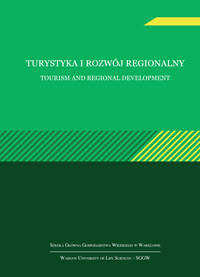Main Article Content
Article Details
Buhalis, D. (2003). E-Tourism. Information Technology for Strategic Tourism Management. Prentice Hall, Harlow, UK.
Buhalis, D., Deimezi, O. (2004). E-Tourism Developments in Greece: Information Communication Technologies Adoption for the Strategic Management of the Greek Tourism Industry. Tourism and Hospitality Research, 5 (2), pp. 103–130. Available online: http://www.jstor.org/stable/23743826 (access: 11.10.2023). (Crossref)
Buhalis, D., O’Connor, P. (2005). Information Communication Technology Revolutionizing Tourism. Tourism Recreation Research, 30 (3), pp. 7–16. DOI: https://doi.org/10.1080/02508281.2005.11081482 (Crossref)
Di Gregorio, D., Kassicieh, S. K., Neto, R. D. G. (2005). Drivers of e-business activity in developed and emerging markets. IEEE Transactions on Engineering Management, 52 (2), pp. 155–166. DOI: http://doi.org/10.1109/TEM.2005.844464 (Crossref)
El-Gohary, H. (2012). Factors affecting E-Marketing adoption and implementation in tourism firms: An empirical investigation of Egyptian small tourism organisations. Tourism Management, 33 (5), pp. 1256–1269. DOI: http://doi.org/10.1016/j.tourman.2011.10.013 (Crossref)
Ghorbani, A., Danaei, A., Zargar, S. M., Hematian, H. (2019). Designing of smart tourism organization (STO) for tourism management: A case study of tourism organizations of South Khorasan province, Iran. Heliyon, 5 (6), e01864. DOI: https://doi.org/10.1016/j.heliyon.2019.e01850 (Crossref)
Gontar, B., Papińska-Kacperek, J. (2011) Semantyczne wyszukiwarki internetowe, Folia Oeconomica, 261, pp. 165-179.
Halkiopoulos, C., Antonopoulou, H., Papadopoulos, D., Giannoukou, I., Gkintoni, E. (2020). Online reservation systems in e-Business: Analyzing decision making in e-Tourism. Journal of Tourism, Heritage & Services Marketing (JTHSM), 6 (1), pp. 9–16. DOI: http://doi.org.10.5281/zenodo.3603312
Jeng, C. R. (2019). The Role of Trust in Explaining Tourists’ Behavioral Intention to Use E-booking Services in Taiwan. Journal of China Tourism Research, 15 (1), pp.1–12. DOI: http://doi.org.10.1080/19388160.2018.1561584. (Crossref)
Kanellopoulos, D. N. (2010). Etourism Services and Technologies: Current Issues and Trends. Journal of Tourism Research, 1 (1), pp. 12–32.
Kisielnicki, J., Sroka, H. (2005). Business information systems. Informatics for management. Warszawa: Placet.
Kuzior, A., Lyulyov, O., Pimonenko, T., Kwiliński, A., Krawczyk, D. (2021). Post-Industrial Tourism as a Driver of Sustainable Development. Sustainability, 13 (15), p. 8145. DOI: https://doi.org/10.3390/su13158145 (Crossref)
Lee, U. K. (2022). Tourism Using Virtual Reality: Media Richness and Information System Successes. Sustainability, 14 (7), p. 3975. DOI: https://doi.org/10.3390/su14073975 (Crossref)
Li, P. Zhou, Y., Huang, S. (2023). Role of information technology in the development of e-tourism marketing: A contextual suggestion. Economic Analysis and Policy, 78, pp. 307–318. DOI: https://doi.org/10.1016/j.eap.2023.03.010 (Crossref)
Luc, M., Tejwan-Bopp, M., Bopp, K., Szmańda, J. B. (2016). E-turystyka natywna szansą rozwoju przedsiębiorczości wśród społeczności lokalnych. Przedsiębiorczość – Edukacja, 12, p. 253. (Crossref)
Matopoulos, A., Vlachopoulou, M., Manthou, V. (2009). Understanding the factors affecting . e-business adoption and impact on logistics processes. Journal of Manufacturing Technology Management, Journal of Manufacturing Technology Management, 20 (6), pp. 853–865. DOI: https://doi.org.10.1108/17410380910975113 (Crossref)
Mitsche, N., Strielkowski, W. (2016). Tourism e-services and Jewish heritage: a case study of Prague. European Journal of Tourism, Hospitality and Recreation, 7, pp. 203–211. DOI: https://doi.org/10.1515/ejthr-2016-0022 (Crossref)
Ödemiş, M. (2022). Smart Tourism Destinations: A Literature Review on Applications in Turkey’s Touristic Destinations. Optimizing Digital Solutions for Hyper-Personalization in Tourism and Hospitality, pp. 131–153. DOI: https://dx.doi.org/10.4018/978-1-7998-8306-7.ch007 (Crossref)
Peng, L., Lai, L. (2014). A service innovation evaluation framework for tourism e-commerce in China based on BP neural network. Electron Markets 24, pp. 37–46. DOI: https://doi.org/10.1007/s12525-013-0148-0 (Crossref)
Ramos, C. M. Q., Rodrigues, P. M. M. (2013). Research Note: The Importance of Online Tourism Demand. Tourism Economics, 19 (6), pp. 1443–1447. DOI: https://doi.org/10.5367/te.2013.0253 (Crossref)
Regulation (EU) No 692/2011 of the European Parliament and of the Council of 6 July 2011 .
concerning European statistics on tourism and repealing Council Directive 95/57/EC Text with EEA relevance. ELI: http://data.europa.eu/eli/reg/2011/692/ojSingh, S., Bashar, A. (2021). A bibliometric review on the development in e-tourism research. International Hospitality Review. DOI: https://doi.org/10.1108/ihr-03-2021-0015 (Crossref)
Stiakakis, E., Georgiadis, C. K. (2011). Drivers of a tourism e-business strategy: the impact of information and communication technologies. Operational Research, 11, 149–169. DOI: https://doi.org/10.1007/s12351-009-0046-6 (Crossref)
Toffler, A. (2006). Trzecia fala. Poznań: Wydawnictwo Kurpisz.
Van der Besselaar, P., Tanabe, M., Ishida, T. (2002) Introduction: Digital Cities Research and Open Issues. Lecture Notes in Computer Science. DOI: http://doi.org.10.1007/3-540-45636-8_1 (Crossref)
Wang, J. (2001). Developments in digital business (G53DDB). Tourism & Travel, Research Institute. Nottingham: Nottingham University Business School.
Downloads
- Marzena Lemanowicz, Karina Adamska, Determinanty postaw konsumentów wobec żywności wygodnej , Turystyka i Rozwój Regionalny: Nr 20 (2023)
Możesz również Rozpocznij zaawansowane wyszukiwanie podobieństw dla tego artykułu.
- Arkadiusz Weremczuk, Michał Wielechowski, Joanna Wrzesińska-Kowal, Developments and convergence of real housing prices in Poland during the COVID-19 pandemic: focus on voivodeship capitals , Turystyka i Rozwój Regionalny: Nr 16 (2021)
- Arkadiusz Weremczuk, Pavel Kotyza, Michał Wielechowski, Development and potentialof renewable energy sources in Poland , Turystyka i Rozwój Regionalny: Nr 23 (2025)
- Marta Suchan, Szymon Mitkow, Paulina Owczarek, Analiza wykorzystania transportu lotniczego w ruchupasażerskim w polskich portach lotniczych , Turystyka i Rozwój Regionalny: Nr 23 (2025)
- Maria Andrzejak, Arkadiusz Weremczuk, Michał Wielechowski, Credit situation of microenterprises in Poland – trends and implications , Turystyka i Rozwój Regionalny: Nr 18 (2022)

Utwór dostępny jest na licencji Creative Commons Uznanie autorstwa – Użycie niekomercyjne 4.0 Międzynarodowe.





